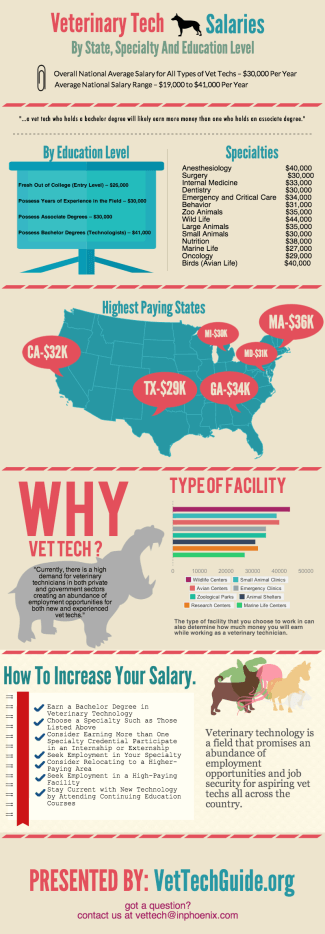If you love animals and have been thinking about enrolling in a training program to become a veterinary technician, you may be wondering what your salary will be like when you begin working.
Veterinary technicians are capable of earning quite comfortable salaries.
However, the exact amount of money that you will earn as a vet tech depends on various factors that we will examine in detail below.

Overall National Average Vet Tech Salary
Before looking at the various factors that can affect the salary you will earn as a vet tech, we will look at the overall national average salaries for all types of veterinary technicians today.
Keep in mind that these figures are current as of January, 2014. As such, the actual average salary you can expect when you begin working in the field may be slightly higher or lower than these amounts.
- Overall National Average Salary for All Types of Vet Techs – $30,000 Per Year
- Average National Salary Range – $19,000 to $41,000 Per Year
Education and Experience
Just as with any other professional occupation, if you possess a significant amount of education and/or experience in veterinary technology, you can often obtain a higher salary.
For example, a vet tech who holds a bachelor degree will likely earn more money than one who holds an associate degree.
Likewise, a veterinary technician who is fresh out of college will probably earn a lower salary than one who has accumulated years of experience in the field. Look below to see some of the current average yearly salaries (as of 2014) for veterinary techs who have varying amounts of education and experience.
- Vet Techs Fresh Out of College (Entry Level) – $26,000
- Vet Techs Who Possess Years of Experience in the Field – $30,000
- Veterinary Technicians Who Possess Associate Degrees – $30,000
- Veterinary Technicians Who Possess Bachelor Degrees (Technologists) – $41,000
Building Your Resume
When building your veterinary technician resume, it goes without saying that you will want to include such things as your education and any intern or externships that you have participated in.
However, just how can you make your resume look appealing enough for a high salary if you do not have much experience in the field?
Fortunately, there are many effective ways to make your resume look terrific. First of all, while you are still in college, make a point to volunteer your services to as many animal-related charities and organizations as you can. This can include such charities and organizations as those listed here.
- Local Animal Shelters
- Local Humane Societies
- Your Local Society for Prevention of Cruelty to Animals
- Local No-Kill Shelters
- Local Animal Rescue Groups
Another way to gain experience that you can use to spruce up your resume is to obtain a part time job in an animal-related business.
This method not only can boost your worth, but it can also help you pay for some of your college-related expenses.
A few of the types of jobs you may wish to consider are as follows.
- Pet Shops (Sales Associates, Stock Persons or Clean-up Persons)
- Grooming Shops (Assistants, Receptionists or Clean-up Persons)
- Boarding Kennels (Kennel Hands)
- Local Farms (Farm Hands)
- Animal Shelters (Kennel Hands)
- Small Animal Clinics or Hospitals (Kennel Hands)
Other things you can do to make yourself and your resume look great include joining various vet tech-related organizations, offering dog-walking services, offering pet-sitting services and participating in your school’s government offices.
All of these things can look quite appealing on your resume and boost your worth to potential employers after you graduate.
Salary and Intern or Externships
 Participation in an intern or externship can prove to be quite valuable when it comes time to apply for employment and negotiate your salary.
Participation in an intern or externship can prove to be quite valuable when it comes time to apply for employment and negotiate your salary.
While most veterinary technology programs require you to complete an intern or externship, there are a few that do not. Nevertheless, it always pays in the long-term if you choose to participate in one.
In some cases, your school of choice will help you locate a facility that offers intern or externships for prospective vet techs.
However, in some cases, it will be up to you to locate one. This is actually a lot easier than it may sound if you use one or more of the following methods.
- Check With Your Local Veterinary Clinics and Hospitals
- Check With Your Local Animal Shelter
- Check With Any Zoological Parks or Wild Life Centers in Your Area
- Check Online for Any Available Vet Tech Intern or Externships in Your Area
- Check With Your Local Employment Agency
- Check With Your School’s Employment Office
There are many wonderful benefits to participating in an intern or externship. Not only do they offer you valuable hands-on work experience that you can add to your resume, but they can also give you an upper hand during salary negotiations. This is especially true if the intern or externship you choose involves a specialty that you wish to pursue.
Salaries for Vet Tech Specialties
Another factor that can determine how much money you will earn as a vet tech is whether or not you choose to become a veterinary technician specialist, or VTS.
Choosing to specialize in one or more areas of veterinary technology can significantly increase your employment opportunities and in some cases, your salary.
There are many areas that you can choose to specialize in, and you will find the most popular specialties and their average yearly salaries as of 2014 listed below.
- Anesthesiology – $40,000
- Surgery – $30,000

- Internal Medicine – $33,000
- Dentistry – $30,000
- Emergency and Critical Care – $34,000
- Behavior – $31,000
- Zoo Animals – $35,000
- Wild Life – $44,000
- Large Animals – $35,000
- Small Animals – $30,000
- Nutrition – $38,000
- Marine Life – $27,000
- Oncology – $29,000
- Birds (Avian Life) – $40,000
Type of Facility
The type of facility that you choose to work in can also determine how much money you will earn while working as a veterinary technician.
There are many different facilities that employ vet techs: from traditional small animal clinics and hospitals to exotic marine and wild life parks.
In fact, the list is quite extensive. However, you will find some of the more popular facilities listed below along with the average annual salaries that they offer to their veterinary technicians (as of 2014).
- Small Animal Clinics – $39,000
- Larger Animal Hospitals – $32,000
- Emergency Veterinary Clinics – $35,000
- Wildlife Centers/Parks – $44,000
- Marine Life Centers/Parks – $27,000
- Aquariums – $28,000
- Avian (Bird) Centers/Parks – $40,000
- Zoological Parks – $35,000
- Animal Shelters – $31,000
- Research Centers – $32,000
- Educational Facilities – $29,000
- Pharmaceutical Centers – $27,000
Highest-Paying States for Vet Techs
The state where you will be working as a veterinary technician plays a large part in determining your salary as well. Some states simply pay their vet techs more than others, and you will find the highest-paying states and their yearly average salaries as of 2014 listed below.
However, keep in mind that these figures are just overall state-wide averages, and salaries may differ from one city to another within the same state.
- $36,000 – Massachusetts, New York and Washington DC
- $34,000 – Connecticut, Georgia and Illinois
- $32,000 – California, Mississippi and New Jersey
- $31,000 – Maryland
- $30,000 – Alabama, Michigan, Virginia and Washington
- $29,000 – Arkansas, Indiana, Iowa, Missouri, New Hampshire, North Carolina, Ohio, Pennsylvania, South Carolina and Texas
- $29,000 – Florida, Oregon, Rhode Island, Tennessee and West Virginia
Lowest-Paying States for Vet Techs
Now that you know the highest-paying states for veterinary technicians today, you may be wondering which states pay their technicians the least. Listed below, you will find the lowest-paying states for vet techs and their coinciding annual salaries as of the year 2014.
- $19,000 – Hawaii and Idaho
- $22,000 – Nebraska and South Dakota
- $23,000 – Alaska and Utah
- $24,000 – Nevada
- $25,000 – Arizona, Kentucky and Wyoming
- $26,000 – Colorado, Louisiana, Maine, Minnesota, New Mexico and North Dakota
- $27,000 – Delaware, Kansas, Montana, Oklahoma, Vermont and Wisconsin
Common Employee Benefits
As a veterinary technician, you may be eligible for various employee benefits in addition to your salary. Of course, this depends on your employer and/or your employee status.
For example, some smaller facilities do not offer fringe benefits at all, and some facilities only offer them to their full time staff members.
Nevertheless, there are many businesses that do offer benefits to their vet techs, and some of the most common perks you can expect are as follows.
- Health Insurance
- Dental Insurance
- Retirement Plans
- Annual or Regular Pay Raises
- Overtime and Holiday Pay
- Paid Vacations
- Sick Pay
- Maternity and Family Leave
- Uniform Allowances
The Importance of Continuing Education
Too many people think that their education ends once they graduate and obtain employment in their field of choice.
Unfortunately, this is one of the main reasons why so many individuals do not earn the salaries that they would like to earn. If you truly want to succeed as a vet tech and earn the best salary possible, you must stay on top of your education.
What this means is that you need to take advantage of any training opportunities that may come your way. Although you will be required to attend a certain amount of continuing education courses each time you renew your vet tech license, do not let your education stop there.
Whenever you have the time, attend other training sessions as well. These can include such events as those that follow.
- Veterinary Technology or Medicine-Related Continuing Education Courses
- Other Animal-Related Continuing Education Courses
- Professional Grooming Courses
- Animal Training or Behavior Courses
- Veterinary Technology or Medicine Seminars
- Veterinary Technology or Medicine Conventions
Best Methods to Increase Your Salary
If you are like most other people today, you probably want to make sure that you will earn the highest salary possible in your field after graduation.
If this is true for you, there are several things you can do to increase your salary potential as a vet tech. These methods are listed below, but you need to keep in mind that some of these methods will take some time to accomplish.
- Earn a Bachelor Degree in Veterinary Technology
- Choose a Specialty Such as Those Listed Above
- Consider Earning More than One Specialty Credential
- Participate in an Internship or Externship
- Seek Employment in Your Specialty
- Consider Relocating to a Higher-Paying Area
- Seek Employment in a High-Paying Facility
- Stay Current with New Technology by Attending Continuing Education Courses
Salary and Job Interviews
Salary can be a difficult subject to talk about during a job interview.
Furthermore, while employers typically have maximum amounts that they will allow for open positions, they still want to hire qualified techs for the least amount of money possible. As such, they most likely will ask you how much you would like to be paid.
First of all, it is always best for you to research average salaries for the position in question before you even go to your job interview. Next, consider a minimum amount you will work for and a maximum amount you would like to earn. This will give you a salary range to work with when negotiating wages.
Secondly, never bring the subject of salary up during a job interview. Always let the employer begin the conversation. When asked about salary, ask the interviewer whether or not the company offers any perks. If they do offer employee benefits, find out exactly what they offer. If the benefit package is extremely appealing, you may be willing to settle for a lower salary.
Conversely, if they do not offer any perks, you may want to push for a higher salary. Other reasons you may want to ask for higher wages include commute time/distance, your accumulated education and your experience.
However, you should always keep in mind that you may not get the exact salary you want. Additionally, never “demand” a high salary: negotiate politely.
Vet Tech Career Outlook

Currently, there is a high demand for veterinary technicians in both private and government sectors creating an abundance of employment opportunities for both new and experienced vet techs.
There are many reasons for this demand; however, one of the main reasons is that pet ownership is on the rise all over the country.
Another reason is that there is a greater awareness of the importance of proper healthcare for pets. What this means is that more and more pet owners are looking for quality veterinary care for their cherished pets. Furthermore, not only does this mean that there is a need for vet techs in animal clinics and hospitals, but there is a need for them in many other facilities as well.
In fact, there is a great need for qualified veterinary technicians in such facilities as biomedical research centers, pharmaceutical companies, animal shelters, colleges and universities.
Additionally, according to research collected and posted by the United States Bureau of Labor Statistics, the demand for vet techs will continue to increase at a rate of around 40 percent until the year 2018!
Veterinary technology is a lucrative field that promises an abundance of employment opportunities and job security for aspiring vet techs all across the country.
If you have been thinking about training for a veterinary technician career, you most likely want to be sure that you will earn a comfortable salary. Although the exact salary you will earn depends on several factors, the examples above can give you an idea of what to expect.

